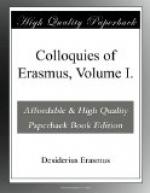he immediately subjoins, Meat is for the Belly,
and the Belly for Meat. Intimating, that in
a Case of Necessity, and for a Season, a Man may eat
any Thing, unless Charity towards his Neighbour shall
dissuade it: But that Uncleanness is in all Persons,
and at all Times to be detested. It is Matter
of Necessity that we eat, but that Necessity shall
be taken away at the Resurrection of the Dead.
But if we are lustful, that proceeds from Wickedness.
But there is another Scruple that I can’t tell
how to solve, or how to reconcile to that Passage:
But I will not be brought under the Power of any.
For he says, he has the Power of all Things, and yet
he will not be brought under the Power of any one.
If he may be said to be under another Man’s
Power, that abstains for Fear of offending, it is what
he speaks of himself in the ninth Chapter, For
though I be free from all Men, yet have made myself
Servant to all, that I may gain all. St. Ambrose
stumbling, I suppose, at this Scruple, takes this to
be the Apostle’s genuine Sense for the better
Understanding of what he says in the 9th Chapter,
where he claims to himself the Power of doing that
which the rest of the Apostles (either true or false)
did, of receiving a Maintenance from them to whom
he preach’d the Gospel. But he forbore
this, although he might have done it, as a Thing expedient
among the Corinthians, whom he reprov’d
for so many and enormous Iniquities. And moreover,
he that receives, is in some Degree in the Power of
him from whom he receives, and suffers some Kind of
Abatement in his Authority. For he that takes,
cannot so freely reprove his Benefactor; and he that
gives will not so easily take a Reprehension from him
that he has obliged. And in this did the Apostle
Paul abstain from that which was lawful, for
the Credit of his apostolical Liberty, which in this
Case he would not have to be rendered obnoxious to
any one, that he might with the greater Freedom and
Authority reprehend their Vices. Indeed, I like
this Explication of St. Ambrose very well.
But yet, if any Body had rather apply this Passage
to Meats, St. Paul’s, Saying, but I
will not be brought under the Power of any, may
be taken in this Sense: Although I may sometimes
abstain from Meats offered to Idols, or forbidden
by the Mosaical Law, out of Regard to the Salvation
of my Brothers Souls, and the Furtherance of the Gospel;
yet my Mind is free, well knowing that it is lawful
to eat all Manner of Meats, according to the Necessity
of the Body. But there were some false Apostles,
who went about to persuade them, that some Meats,
were in themselves, by their own Nature unclean, and
were to be forborn, not upon Occasion only, but at
all Times; and that as strict as Adultery or Murder.
Now those that were thus misled, were reduced under
another’s Power, and fell from their Gospel
Liberty. Theophylact (as I remember) is the
only Man that advances an Opinion different from all
these. It is lawful, says he, to eat all
Sorts of Meats; but it is not expedient to eat to Excess;
for from Luxury comes Lust. There is no Impiety,
indeed, in this Sense; but it does not seem to me
to be the genuine Sense of the Place. I have
acquainted you with my Scruples, it will become your
Charity to set me to Rights.




